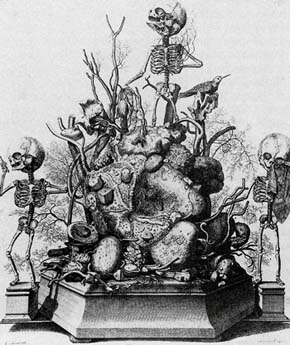|
|
|
Close Help | ||||||||||||||
The Baroque period in the 17th century was characterised by the great interest of researchers in the study and philosophical-scientific explanation of Man and the world within the context of dualism and mechanicism, where the human body was considered as an Opus Dei (Work of God), the Receptacle for the Soul, but functioning as a perfect machine, an analogue to the mechanical machines made by man (René Descartes and Cartesian rationalism). Researchers devoted themselves to the description of the human body with immense seriousness and zeal. Many anatomic details (e.g., blood circulation, etc.) were discovered due to the contribution of the technologies of microscopy, and also comparative anatomy and animal vivisection.
 Tento článek získal ocenění: Cena Antonína Friče
Tento článek získal ocenění: Cena Antonína Friče
p. 236

© Archive M. Chumchalová